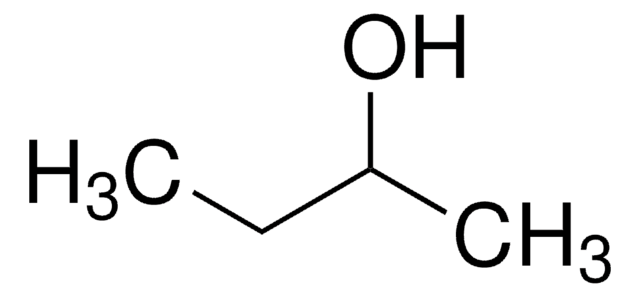03-4570
1-Butanol
SAJ first grade, ≥99.0%
Synonym(s):
n-Butanol, Butyl alcohol
About This Item
Recommended Products
grade
SAJ first grade
vapor density
2.55 (vs air)
Assay
≥99.0%
form
liquid
autoignition temp.
649 °F
expl. lim.
11.2 %
availability
available only in Japan
refractive index
n20/D 1.399 (lit.)
bp
116-118 °C (lit.)
mp
−90 °C (lit.)
density
0.81 g/mL at 25 °C (lit.)
SMILES string
CCCCO
InChI
1S/C4H10O/c1-2-3-4-5/h5H,2-4H2,1H3
InChI key
LRHPLDYGYMQRHN-UHFFFAOYSA-N
Looking for similar products? Visit Product Comparison Guide
Signal Word
Danger
Hazard Statements
Precautionary Statements
Hazard Classifications
Acute Tox. 4 Oral - Eye Dam. 1 - Flam. Liq. 3 - Skin Irrit. 2 - STOT SE 3
Target Organs
Central nervous system, Respiratory system
Storage Class Code
3 - Flammable liquids
WGK
WGK 1
Flash Point(F)
84.2 °F
Flash Point(C)
29 °C
Regulatory Listings
Regulatory Listings are mainly provided for chemical products. Only limited information can be provided here for non-chemical products. No entry means none of the components are listed. It is the user’s obligation to ensure the safe and legal use of the product.
FSL
Group 4: Flammable liquids
Type 2 petroleums
Hazardous rank III
Water insoluble liquid
ISHL Indicated Name
Substances Subject to be Indicated Names
ISHL Notified Names
Substances Subject to be Notified Names
JAN Code
03-4570-8-14KG-J:
03-4570-5-500ML-J:
03-4570-3-3L-J:
Certificates of Analysis (COA)
Search for Certificates of Analysis (COA) by entering the products Lot/Batch Number. Lot and Batch Numbers can be found on a product’s label following the words ‘Lot’ or ‘Batch’.
Already Own This Product?
Find documentation for the products that you have recently purchased in the Document Library.
Our team of scientists has experience in all areas of research including Life Science, Material Science, Chemical Synthesis, Chromatography, Analytical and many others.
Contact Technical Service










